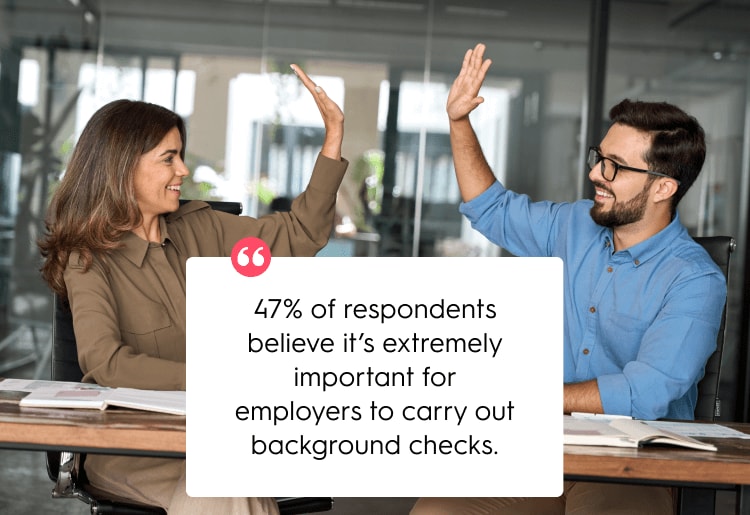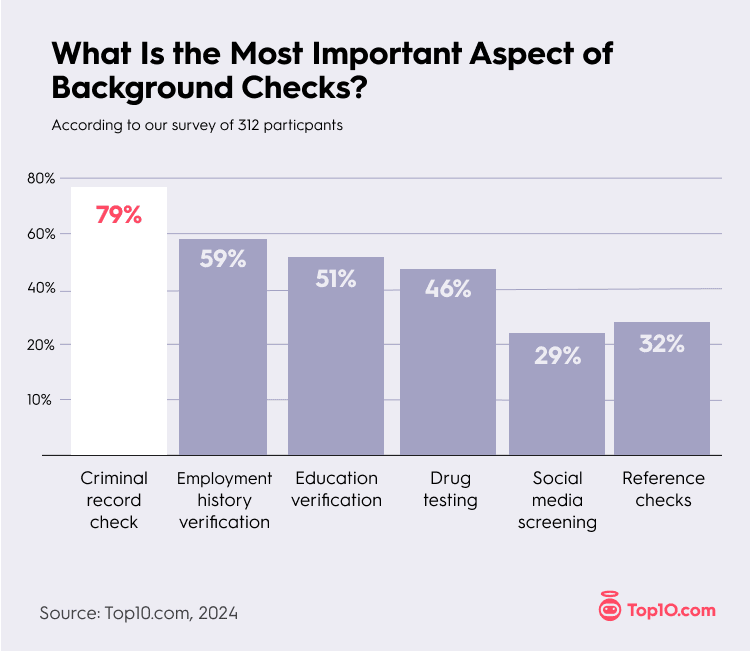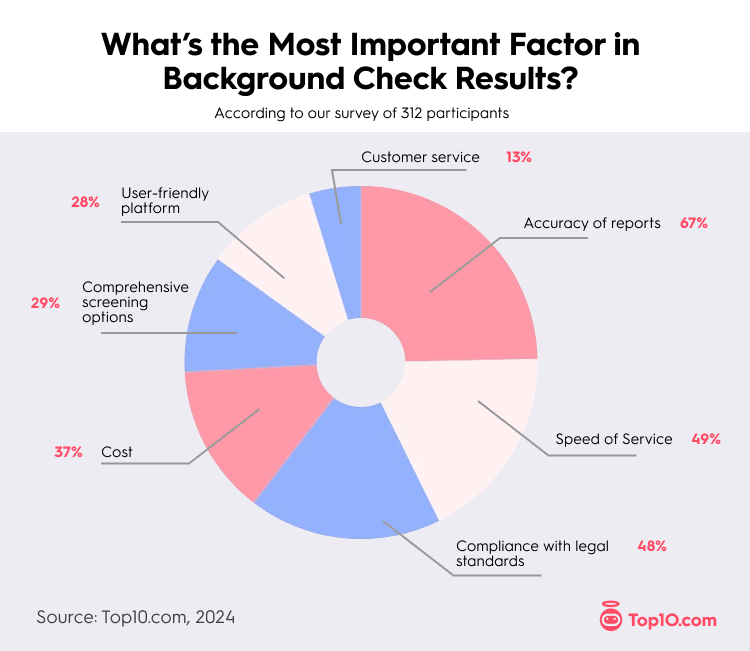Our latest survey reveals that employees themselves recognize the importance of these screenings, emphasizing their role in ensuring workplace safety and trust.
Our "Employer Screening Practices Survey" delves into how members of the general public perceive the significance of background checks and the effect these checks have on creating secure work environments. The findings provide valuable insights for employers navigating the myriad of background check services available today.
Nearly Half of Participants (47%) See Background Checks as Extremely Important
An overwhelming majority of the survey participants (85%) consider background checks to be either important or extremely important in the hiring process. Specifically, 47.12% of respondents rated them as extremely important, while 37.82% viewed them as important. Only a small fraction expressed neutrality (13.14%), and even fewer saw them as unimportant (0.64%) or very unimportant (1.28%).
- Extremely important: 47%
Important: 38%
Neutral: 13%
Unimportant: 0.6%
Very unimportant: 1.3%
This strong consensus underscores the significant role that comprehensive background checks play in the minds of employees, highlighting their perceived importance in ensuring workplace safety and the integrity of new hires.

79.17% Value Criminal Record Checks the Most
When asked which aspects of background checks matter most, 79% of respondents pointed to criminal record checks. This finding highlights the importance employees place on workplace safety and the need for employers to prioritize these checks in their hiring process. By ensuring a thorough vetting process, employers can create a safer environment for their workforce.

40% Completely Trust Background Checks
Trust in the accuracy of background checks is generally high among respondents. A significant 40% trust them completely, and 39% trust them most of the time.
Trust completely: 40%
Trust most of the time: 39%
Trust sometimes: 12%
Rarely trust: 3%
Never trust: 0.3%
No experience: 7%
While confidence in background checks is strong, there is always room for improvement. Employers should choose providers that use up-to-date databases and rigorous verification processes. Being transparent about the methods and sources used can further enhance trust and ensure that users feel secure in the information provided.
36% Believe Background Checks Are Very Effective for Workplace Safety
Survey participants recognize the role of background checks in improving workplace safety, with 36% considering them very effective.
Very effective: 36%
Somewhat effective: 44%
Neutral: 14%
Somewhat ineffective: 5%
Very ineffective: 2%
This broad recognition shows that background checks are key in creating a safer and more trustworthy work environment. Companies should combine background checks with ongoing monitoring and periodic re-screening to provide continuous protection against potential threats.
53% Experienced Positive Outcomes from Background Checks
More than half of the respondents (53%) reported experiencing positive outcomes from background checks in their workplaces, such as feeling more secure or seeing fewer issues with new hires. This demonstrates the tangible benefits that employees perceive when thorough background checks are conducted, contributing to a safer and more trustworthy work environment.
- Yes: 53%
No: 23%
Not sure: 24%
The benefits of background checks are clear in their ability to prevent costly hiring mistakes. Employers should use detailed background checks to verify a candidate’s professional history and ensure they have the qualifications and experience claimed. This due diligence can save significant resources and foster a more productive workforce.

48% Do Not Believe Background Checks Invade Privacy
While privacy remains a concern, with 39% feeling that background checks invade personal privacy, a larger proportion (48%) disagrees. This highlights the importance of transparency and clear employer communication regarding the screening process.
- Yes: 39%
No: 48%
Not sure: 13%
Balancing thorough background checks with respect for privacy is crucial. Employers should be transparent about their screening processes and obtain explicit consent from candidates. Clear communication about what information will be checked and how it will be used can help alleviate privacy concerns and build trust.
72% Feel Safer with Thorough Background Checks
A significant 72% of respondents indicated that they would feel safer knowing their colleagues had undergone thorough background checks.
- Yes: 72%
No: 12%
Neutral: 17%
The sense of security that thorough background checks provide is significant for both employers and employees. This reassurance can enhance team cohesion and overall job satisfaction. Employers should consider this psychological benefit when designing their background check policies, ensuring they communicate the protective measures in place to their workforce.
52% Prefer Background Checks to Be Updated As Needed
Opinions on how frequently employers should update background checks for current employees vary. The majority (52%) believe checks should be updated as needed, while 21% advocate for monthly updates, and 17% prefer biannual updates.
Monthly: 21%
Biannually: 17%
As needed: 52%
Never: 11%
The varied preferences for the frequency of background check updates suggest that employers need a flexible approach. High-risk industries, such as healthcare or finance, may require more frequent checks, while others might opt for periodic reviews. Implementing a risk-based assessment model can help determine the appropriate intervals for re-screening, balancing thoroughness with practicality.
67% Highlight Accuracy as the Most Important Factor
When conducting background checks, respondents highlighted several critical factors. Accuracy of reports appears to be paramount, followed by the speed of service, compliance with legal standards, and cost.

Accuracy in background checks is non-negotiable. Employers must partner with reputable background check providers who use robust data sources and verification methods. Speed and cost are important, but they should not compromise the quality and accuracy of the information. Ensuring compliance with legal standards, such as the FCRA, is also essential to protect both the employer and the candidate from potential legal issues.
Methodology
The "Employer Screening Practices Survey" was conducted online using SurveyMonkey, engaging 312 participants from various industries. The aim was to understand perceptions found among the general public of background checks and their importance in the hiring process. The survey featured questions on the significance, effectiveness, trustworthiness, and impact of background checks on workplace safety and privacy.
The participant pool was diverse, with a balanced gender distribution: 56% female and 44% male. Most participants were between the ages of 30 and 60, with the largest age group being 30-44 years old (32%), followed closely by those aged 45-60 (31%). The participants were primarily from the Middle Atlantic (24%) and South Atlantic (17%) regions. In terms of household income, the majority earned between $50,000 and $74,999 annually, with 15% falling into this range. Additionally, 5% of participants preferred not to disclose their income.
The data collected was thoroughly analyzed to highlight key trends and statistics, showcasing the critical role of background checks in today's job market. The use of SurveyMonkey ensured efficient and accurate data collection, providing a solid basis for the findings presented.
The Case for Background Check Services
The survey results highlight the crucial role that background check services play in the hiring process. The general public clearly values thorough background checks, and for employers, this is a strong signal to invest in these services. Effective background checks help prevent costly hiring mistakes and contribute to a safer, more trustworthy workplace.
With the expanding options for background check providers, it’s essential for employers to choose services that prioritize accuracy and compliance. By doing so, employers can make informed hiring decisions, protect their organizations, and maintain a secure, productive work environment.
In today’s competitive job market, comprehensive background checks are not just recommended—they’re essential for building a successful organization.
